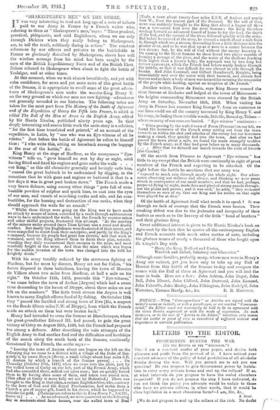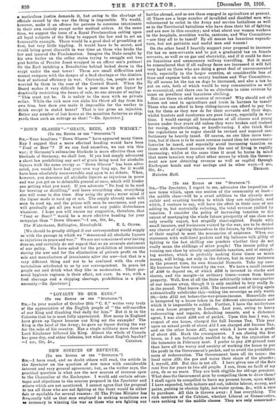LETTERS TO THE EDITOR.
PROHIBITION DURING THE WAR.
[To TIIE ED1TOB Or 711a " SPEC-WM."1 Sirs,—I am a constant reader of your paper, and derive both pleasure and profit from the perusal of it. I have noticed your constant advocacy of the policy of total prohibition of all alcoholic drinks during the war. Will you permit me to ask you one question? Do you propose to give Government power by legisla- tion to enter every private house and seal np the cellars? If so, at what intervals do you propose to have the sealed chambers inspected? If you do net propose the step I have indicated, do you not think the policy you advocate would be unfair to those who have no private cellars; in other words, that it would be class legislation in a most obnoxious form?—I am, Sir, &c.,
A Scar.
[We do not propose to seal up the cellars of the rich. No doubt
a. meticulous justice demands it, but owing to the shortage of officials caused by tho war the thing is impossible. We would, however, make it an offence for persons to consume intoxicants in their own custody except under medical orders. At the same time, we suggest the issue of a Royal Proclamation calling upon all loyal subjects of the King to support the law and to set an honourable example. There would be a good deal of grumbling at first, but very little tippling. It would have to be secret, and would bring great discredit in war time on those who broke the law and ignored the Proclamation. Imagine the Duke caught by his own butler on the cellar stairs trying to smuggle out two pint bottles of Perrier Jouet wrapped in an officer son's puttees ! Or the Earl imbibing a Benedictine behind locked doors in the crypt under the cast tower 1 These are small difficulties and cannot compare with the danger of a food shortage or the diminu- tion of national efficiency in war. Curiously, too, people are not worried by them in the case of the Control Board. When the Board makes it very difficult for a poor man to get liquor by drastically restricting the hours of sale, no one dreams of saying : " This must not be. It is unfair to the man with no private seller. While the rich man can slake his thirst all day from his own bins, how dare you make it impossible for the worker to drink except in stated hours? That is too gross an injustice. Better any number of lost hours at the munition factories or ship- yards than such an outrage as that! "—Ea. Spectator.]



























 Previous page
Previous page